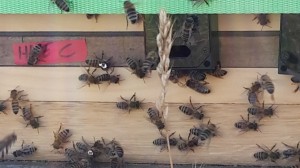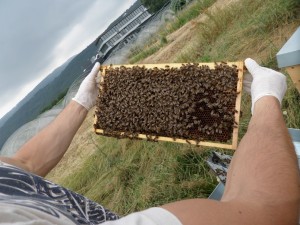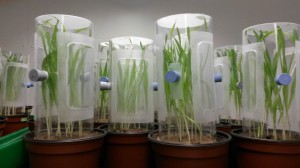For the “Applied Module at External Organizations” (AMEO) the 2nd semester Ecotox students complete an eight-week internship, either performed at an external university, governmental or industrial research institute to apply the competences achieved during their study. Several students used this opportunity to explore new places in Germany, others went out into the big, wide world. This time, Bianca Frombold tells us about her internship at Innovative Environmental Services (IES) in Witterswil, Switzerland.
For my AMEO, I went to Witterswil, a small city in the south of Basel surrounded by nature and agricultural landscape. At IES I supported scientists of the terrestrial ecotoxicology department. Having never worked with honey bees, bumble bees and solitary bees before, the laboratory and field work was very exciting for me. Moreover, I gained practical experience in working under Good Laboratory Practice.
What Innovative Enrivonmental Services is researching:
My employer IES is a research organization performing studies in various fields related to ecotoxicology. The terrestrial ecotoxicology department conducts laboratory, semi-field and field studies on pollinating insects, soil tests and non target arthropod tests to assess acute or chronic effects of plant protection products.
What I actually did:
Labeling honey bees
I caught honey bees by hand for an OECD homing flight ring test and then labeled them with small RFID microchips. The chips allowed tracking of the bees. It was investigated if the honey bees find the way back home to their hive after treatment with neonicotinoids. The insecticides are suspected of altering the bees’ sense of orientation.
Building bee homes
Bees like to feel at home as well. Hence, I was building honeycombs and accessories for several bee studies. We then brought them to the hives in the study fields so that the hardworking bees could build their home out of them for offspring, nectar and pollen. One comb accommodates several hundred bees. However, from time to time the bees need more space for supplies and offspring.
Gardening for wasps
For a test with the parasitic wasp Aphidius rhopalosiphi I planted barley in 90 pots and placed hundreds of aphids on each of them. Female wasps were introduced in the cylinder with the barley and tested for reproduction. In terrestrial ecotoxicology, at the beginning of an experiment you are always more gardener than scientist.
How living in Biel-Benken was:
Biel-Benken is a small village between Basel and IES. I stayed in a hotel with breakfast buffet which was only a 20 minutes’ walk away from my work – very convenient. On weekends I took the bus and tram to Basel city centre for shopping or swimming on hot summer days. All in all, Biel-Benken is a nice trade-off between nature and the city vibe of Basel.
(Based on an interview with Bianca Frombold)



